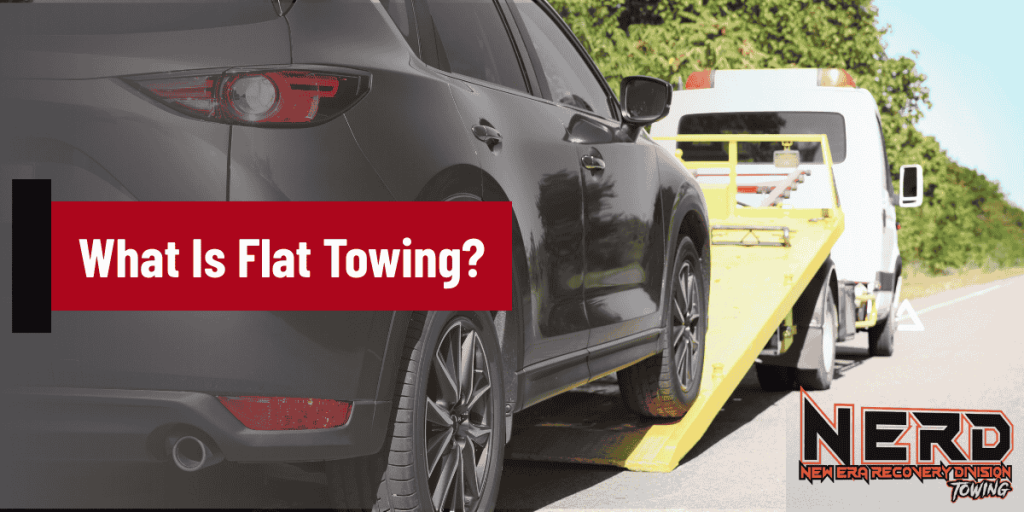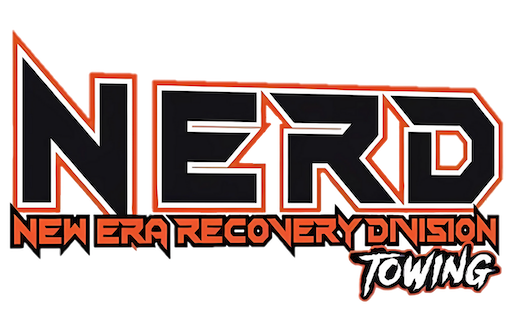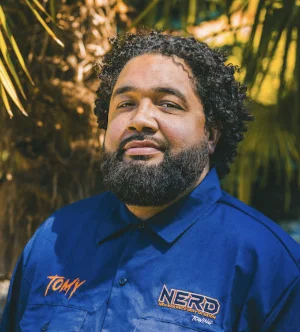
What Is Flat Towing? Washington Driver’s Guide to Safe and Legal Towing
Flat towing, also known as dinghy towing or four-down towing, is a common method of pulling a car with all four wheels on the ground. If you are a driver in Tacoma or anywhere in King and Pierce Counties Washington, understanding what is flat towing can help you prepare your tow vehicle, choose the right hitches and accessories, and avoid expensive mistakes. This guide from NERD Towing explains what flat towing is, how it works, which vehicles qualify, the pros and cons, Washington-specific regulations, and how much it may cost you.
What Is Flat Towing and How Does It Work?
Definition of Flat Towing (aka Dinghy Towing or Four-Down Towing)
Flat towing is when a vehicle is pulled behind another with all four tires rolling on the road. If you have ever wondered what is flat towing compared to trailer hauling, the difference is in weight and complexity. Unlike dolly towing or trailer setups, flat towing does not lift the car onto a platform.
Flat Towing vs. Other Towing Methods (Dolly & Trailer)
- Flat towing: All four tires remain on the road, connected by tow bars.
- Dolly towing: A trailer dolly lifts the front wheels, leaving the rear to roll.
- Full trailer towing: The entire vehicle is loaded onto a flatbed with ball mounts or ramps.
Flat towing is lighter and simpler but only certain vehicles qualify.
Key Components Needed (tow bar, base plate, safety cables, braking system)
- Tow bars and hitches: Connect the tow vehicle to the towed vehicle securely.
- Base plate and ball mounts: Provide the structural connection.
- Safety cables: Prevent separation in case of bar failure.
- Braking system: Required for heavier vehicles to comply with Washington law.
Step-by-Step Overview of the Flat Towing Process
- Install a base plate and hitch mounts on the towed vehicle.
- Connect tow bars and safety chains.
- Attach supplemental braking system and check wiring harness for lights.
- Place transmission in neutral as directed by the manufacturer.
- Test the setup before hitting the road.
What Vehicles Can Be Flat Towed Behind an RV or Truck?
Common Vehicle Types That Are Flat Tow-Approved (manual transmissions, AWD, etc.)
Vehicles with manual transmissions are the most commonly flat towed. Some 4×4 SUVs and AWD systems with proper transfer cases are also approved for flat towing.
Manufacturer Recommendations & Owner’s Manual Tips
Always confirm through the owner’s manual whether your car can be towed four-down. Ignoring factory recommendations can destroy a transmission.
Vehicles That Should NOT Be Flat Towed
Cars with CVTs, certain automatics, and most electric vehicles cannot be towed flat. These drivetrains suffer major damage if towed without a trailer.
Examples of Popular Flat Tow-Friendly Models in the U.S.
- Jeep Wrangler and Jeep Cherokee (select trims)
- Ford F-150 with proper transfer case
- Chevrolet Colorado and Chevrolet Silverado
- Honda CR-V (earlier model years)
- Ram 1500 and other trucks with manual transmission options
How to Confirm If Your Vehicle Is Flat Tow Compatible
- Read your manual carefully.
- Check transmission and drivetrain notes.
- Ask a professional towing company like NERD Towing before trying.
Pros and Cons of Flat Towing for Washington Drivers
Benefits of Flat Towing (cost, simplicity, space saving)
- No trailer storage required.
- Easier hookup with hitches and accessories.
- Less weight compared to pulling a full trailer.
- Great for RV owners needing a quick secondary car.
Risks and Limitations (wear on drivetrain, legal limits, warranty issues)
- Flat towed vehicles can suffer tire wear.
- Some warranties void coverage if towing flat against guidance.
- Heavy loads strain bars, mounts, and hitches if not rated properly.
Flat Towing in Washington Terrain: Mountains, Snow, and Steep Grades
From Snoqualmie Pass to Mount Rainier, Washington terrain tests every tow vehicle. If you are asking what is flat towing like in snow or rain, the answer is that it requires reliable tow bars, supplemental brakes, and extra caution.
What Are the Signs of Improper Flat Towing Setup?
Steering Wheel Locking or Binding
If the wheel locks, the tow bar height may be wrong.
Uneven Tire Wear or Drivetrain Strain
A misaligned hitch or uneven bar setup can cause premature wear.
Brake Light or ABS Warning Indicators
If lights come on during towing, the system may need adjustments.
Strange Noises or Pulling While Driving
Grinding or dragging sounds often mean the vehicle is not tracking properly.
How Much Does Flat Towing Cost in Washington?
Equipment Costs (tow bars, base plates, braking systems)
- Tow bars: $800 – $1,200
- Base plates and hitches: $500 – $1,000
- Braking accessories: $1,000 – $1,500
Professional Installation Costs (average labor rates in WA)
Washington labor runs $100 – $150 per hour. Full setups often total $2,500 – $4,000.
RV and Towing Insurance Costs in Washington
Insurance add-ons for towed vehicles average $100 – $300 yearly.
Maintenance Costs and Long-Term Ownership Tips
Check transmission fluid, ball mounts, bars, and safety cables routinely. Preventive care keeps flat tow setups safe.
Washington State Laws & Regulations for Flat Towing
Towing Speed Limits and Brake System Requirements
Washington speed limits for towing are generally 60 mph. Braking systems are required on towed vehicles over 3,000 pounds.
Lighting and Visibility Rules (taillights, reflectors)
Towed vehicles must have working lights visible on highways. Reflectors may be needed at night.
Legal Weight Limits and Licensing Rules
Combined gross weight of tow vehicle plus towed vehicle cannot exceed limits set on hitches and mounts.
Special Rules for Towing Through Mountain Passes or I-5 Corridor
Snow chains are required at certain passes. Police may check hitch security and tow bars on major routes.
Why Choose a Professional Flat Towing Service in Tacoma WA?
Safety Benefits of Using a Certified Tow Technician
Professionals ensure tow bars, hitches, and accessories are installed correctly.
Local Knowledge of Terrain, Laws, and Weather
Tacoma and Pierce County roads demand local expertise for safe towing flat.
Emergency Assistance and Roadside Support
If your car or Jeep Wrangler setup fails, a professional service can recover quickly.
Experience with RVs, SUVs, Trucks, and Classic Cars
NERD Towing works with popular models from Ford, Jeep, Chevrolet, and more.
How to Prepare Your Vehicle for Flat Towing in Washington
Pre-Tow Checklist (battery disconnects, key position, fluid checks)
- Verify transmission in correct mode.
- Disconnect battery if required.
- Check fluid levels and mounts.
Tire Pressure, Steering Wheel Settings, and Brake System Setup
- Adjust tires to safe PSI.
- Unlock steering wheel.
- Connect brake accessories properly.
Testing the Tow Before Hitting the Highway
If you are unsure what is flat towing preparation like, always start with a short neighborhood drive. This ensures bars, hitches, and cables function smoothly.
Flat Towing FAQs for Washington Drivers
Can I flat tow an automatic car?
Some models allow towing flat, but most automatics require trailers.
Do I need a supplemental braking system in WA?
Yes, vehicles over 3,000 lbs must use one.
Is flat towing legal on all highways in Washington?
Yes, but only with working lights, legal weight ratings, and proper hitches.
Can I flat tow in snowy or icy weather?
Yes, but drivers must equip chains and check accessories before travel.
Call NERD Towing for Trusted Flat Towing Services in WA
Fast Response Times, 24/7 Availability
Our towing services are available any time of day.
Experienced Technicians and Modern Equipment
We use advanced hitches, tow bars, and accessories to keep every towed vehicle safe.
Locally Owned, Community Trusted
We take pride in serving Tacoma, King County, and Pierce County drivers.
Serving Tacoma, King County, and Pierce County WA
NERD Towing is based in Tacoma and serves all of Pierce and King County. Cities we cover include Tacoma, Federal Way, Kent, Auburn, Puyallup, Lakewood, Renton, and University Place. Whether you need help setting up flat towing, emergency assistance, or roadside support, our tow technicians are here for you.
Get a Free Estimate or Schedule Your Tow Today
Whether you drive a Jeep Wrangler, a Ford truck, or another flat tow-approved model, NERD Towing is your trusted partner. Call us today at (253) 243-8663 for professional towing service in Washington.





